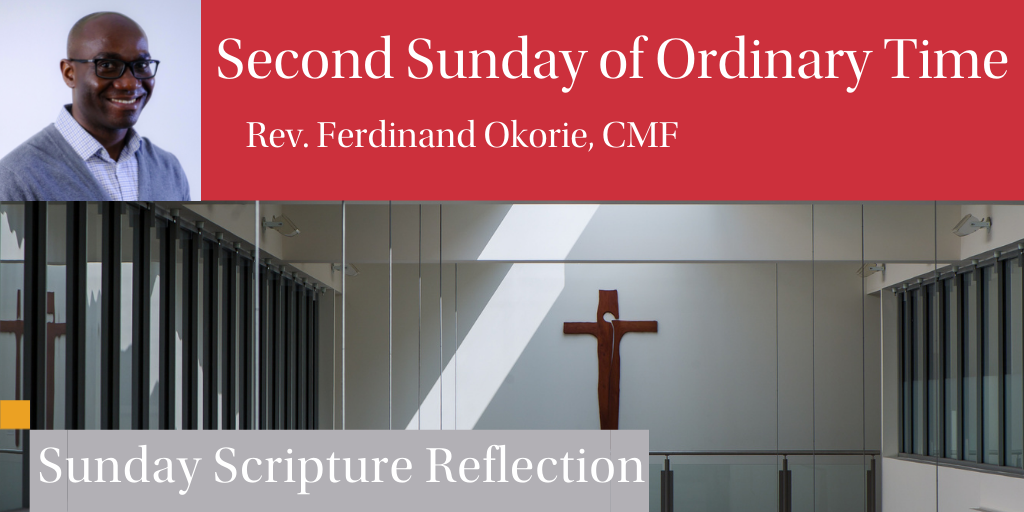

Readings:
Reading 1: Is 62:1-5
Responsorial Psalm: Ps 96:1-3, 7-10
Reading 2: 1 Corinthians 12:4-11
Gospel: John 2:1-11
The Johnsons invited me this past summer to their annual family reunion after covid canceled the event in 2020. Their grandmother is a force for unity to the entire family. She is gifted with the ability to discern unspoken words, and easily diffuses looming scenes of disagreement among family members. She brings the gift of presence to each and every one in her extended family. The Johnsons know that feuding family members will embrace her convincing reasons for reconciliation. Their grandmother remains one evidence of the abiding grace of God’s presence to the entire family. For some people today it is a parent, or a sibling, or a leader or coworker, or someone in the community, or in the church who stands out to them as the presence of the gift of the Spirit of God because this person embodies the nobility and charisma that touch the lives of others.
The Mother of God in the Gospel Reading today is one of such people. At the wedding at Cana, she shares with the bride and groom the gift of attention to details, the ability to notice an impending embarrassing situation, and the disposition to step in and save the day. The wedding at Cana is a lavished display of culture and celebration of the union between two people, with their families, relatives and friends, and Mary, Jesus and his disciples in attendance. The Mother of Jesus notices the impending crisis of shortage of wine while guests are still in the mood for celebration and she knows the solution to the crisis. Perhaps she is a relative to either the groom or bride, and so is Jesus. She approaches Jesus to save the day on behalf of a relative. The dialogue that ensued between Jesus and his mother has received various interpretations. Jesus replied to this mother: “Woman, what is it to you and to me (v 4)?” I’m convinced that this statement reveals Jesus’ knowledge of his mother’s gift to look out for the good of everyone, even if doing so includes soliciting the help of Jesus. Mary does not only ask Jesus to save the day; she also went to the servers, and enlisted their help, telling them to do whatever Jesus asks (v 5). Mary is that mother who is gifted with the ability to bring everyone into the disposition to use their own gifts to benefit others. In this wedding story, the Mother of God, the servers, and Jesus put their gifts to use for the success of the wedding party. “You have kept the good wine until now (v 10),” the guest at the head table acknowledges in delight. Additionally, the disciples of Jesus have Mary to thank for the revelation of Jesus in a profound way beyond what they have known about Jesus up until this point since their calling in the previous chapter (v 11).
Just as the Mother of God saved the day at the wedding at Cana by persuading the servers, and Jesus Christ to put their capacities into operation -their gifts from the spirit of God- to benefit the bride and groom, likewise St. Paul counsels the church in Corinth, reminding them of the various divinely endowed capacities in their ecclesial community that are to be put into use for the good of all. The disposition to put our capacities into use to benefit others (1 Cor 12:7) is the word energéō that St. Paul uses in the Second Reading to describe the workings of the Spirit of God in each one of us (1 Cor 12:6, 11). St. Paul knows that the gift that each and every one of us possesses is useful and beneficial to others. Our gifts have their origin from God who richly endow us with the capacity to contribute to the growth of the human family. St. Paul wants the community to shun the divisive mentality of creating a hierarchy of God’s gifts thereby making some gifts to seem less noble than others. Rather what God has bestowed on each member of the community is proportionate, for building up each other. By speaking in this manner to the Christian community in Corinth, St. Paul desires to bring them to the appreciation of the various gifts that members of the community have been divinely gifted for the good of all. We have learned under covid-19 to appreciate particularly all those who use their gifts to keep our community running: those who collect our garbage, stack up the grocery shelves, deliver our mails and packages, work the hospital floor, and anyone whose job does not come with the luxury of working remotely. We are reminded today that every gift from God is beneficial to all, and noble too.